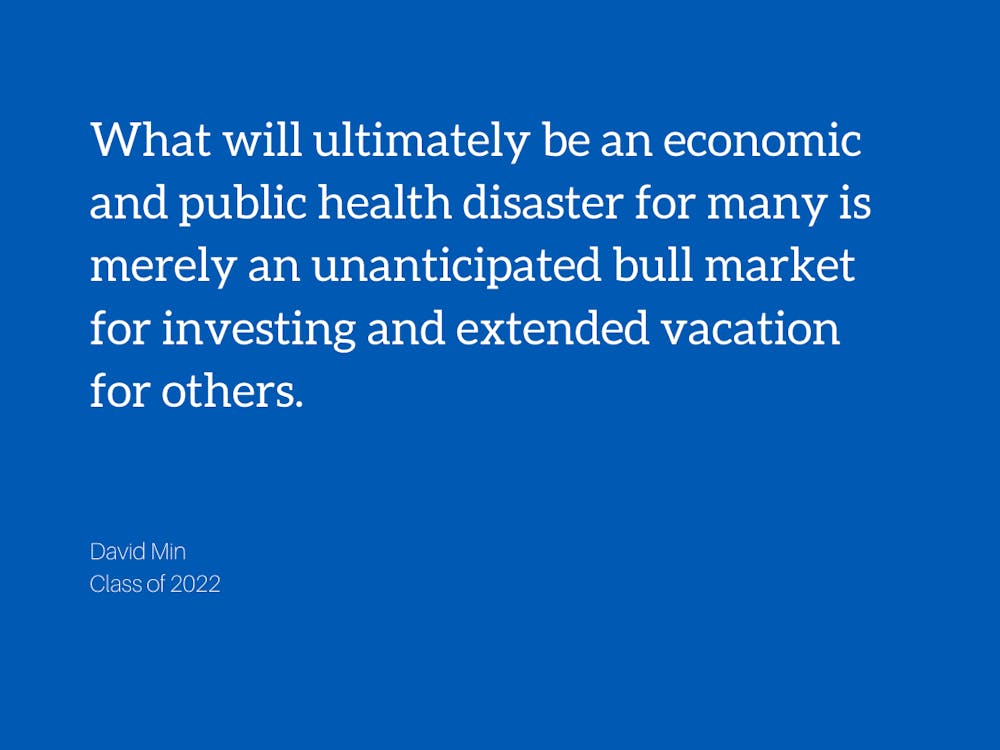The wildfires in California didn’t choose which houses to burn down but the fact of the matter is that some built brand-new dream homes while others were forced to accept their homelessness.
In 2008, a global financial crisis delivered banks a slap on the wrist coupled with bailouts too large for us to seriously wrap our heads around while the rest of the country dealt with the consequences of corporate greed for an entire generation. In the 2019 film Parasite, an extended downpour completely floods one family’s home with sewage but is regarded as a “blessing in disguise” by another one. I could go on and on, but I think you get the point.
Disasters and their ensuing chaos often appear to be equalizing forces that affect all classes and ultimately unite communities. They’re not. They might not purposefully discriminate but they certainly make the lives of some much worse than others. This is no different.
We live in and think about completely different worlds. And by “we”, I mean most members of our Duke community that pulls nearly 70% of its students from the top 20% and boasts a median income of nearly $200,000. These facts alone should tell us a lot about how our families have dealt with Coronavirus and how we will move past it. Many of us will suffer—particularly the immunocompromised and those with older loved ones, parents on the frontlines in hospitals and at work, and other unique situations—and I would never discredit that. But many more of us will be left entirely unscathed, returning to Durham from an all-too-convenient state of boredom, clutching delightfully onto a silver lining, and asking you how your quarantine was.
The presence of a silver lining is precisely the distinction between those who have never known privilege and those teeming with it: a GPA boost from online classes, the “quarantine sucked BUT at least I was able to xyz” spiel, or the bright side of a disaster that will kill many thousands of people just in the United States.
The silver lining is more than simply trying to stay positive and hopeful. It’s a condition of living in entirely different realities, of being able to trust and rely on the existing institutions at play and of having that degree of separation from “what’s going on out there.” It’s what makes chaos coherent for the wealthy because to suffer endlessly without deriving some sort of benefit would be unimaginable. After all, that’s what happens to other people, but not us.
Similarly, our anxiety about being productive and doing work during this period stems not from our status as genius, go-getter Duke students, but rather from that same aura of certainty about mostly not having to confront the virus. The truth is that the privileged aren’t even foolish in believing this. History has proven time and time again that what will ultimately be an economic and public health disaster for many is merely an unanticipated bull market for investing and extended vacation for others.
Don’t twist my words. David Min is not mad that you’re spending your time making mediocre sourdough bread or going jogging for the first time since 11th grade P.E. class. My point isn’t that you’re evil for working on your TikTok editing skills or trying to just do well in school. In fact, I think that almost all of us are committed to similar practices. A lot of these activities are definitely valuable endeavors for our mental and physical wellbeing, but at some point, I wish we as a community would truly grapple with the consequences of this pandemic and empathize with what it means to be the worst well off in this situation.
None of us can really change the trajectory of the virus and it’s not productive to criticize others for being bored and finding activities to pass their time. However, we’re at a turning point in America, a generational moment, at a fork in the road between continued brutalism or a politics of compassion and you should definitely be held accountable for caring about others.
That means truly attempting to understand the material conditions that will define the lives of your classmates and having even the slightest degree of empathy for them. For many people, this will be an instance where life doesn’t seem to happen for a reason and no real benefit emerges to justify their pain.
That means really thinking about what it means right now to not have insurance, to have to put food on the table after being laid off, to suffer mentally and physically because you were forced off Duke’s campus, and to ultimately bear the brunt of this pandemic without coming out the other side with a silver lining of any sort.
David Min is a Trinity sophomore. His column, 'milk before cereal,' usually runs on alternate Mondays.
Get The Chronicle straight to your inbox
Signup for our weekly newsletter. Cancel at any time.

